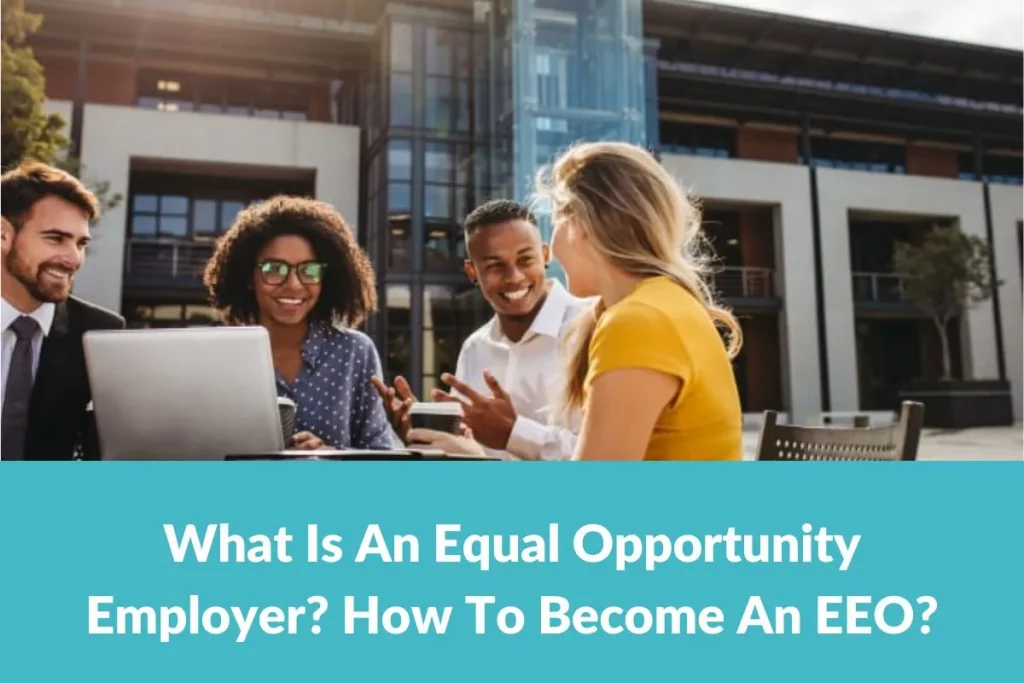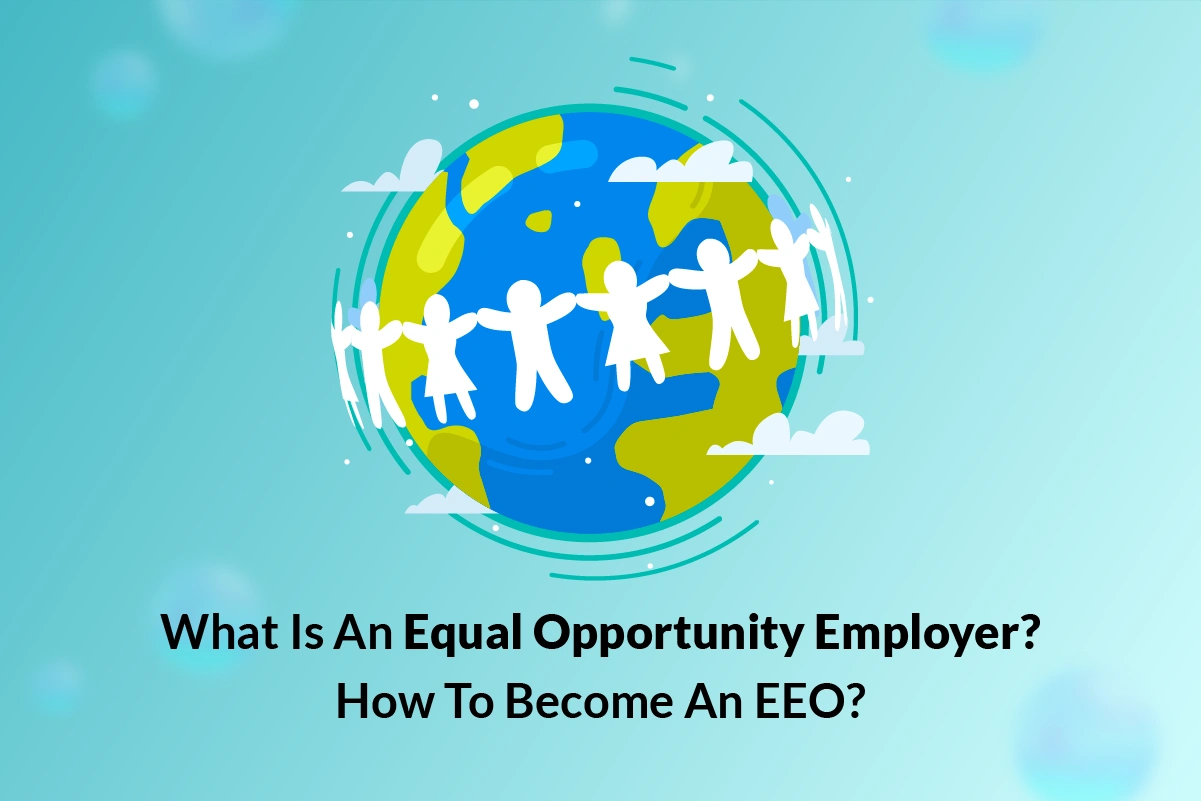What is an equal opportunity employer? The phrase “Equal Opportunity Employer” often appears at the top of the careers section or in job descriptions on the company’s website. However, many people still do not know the true meaning of this phrase.
You might ignore this phrase when you see them, but understanding its meaning can help you establish your company’s hiring standards. So keep reading to learn more!

What is an Equal Opportunity Employer?
“Equal opportunity employer” refers to EEO (Equal Employment Opportunity) compliant employers.
So what is EEO?
EEO (Equal Employment Opportunity) refers to fair and unbiased treatment in the workplace. Any employer will be prohibited from discriminating against their current or potential employees based on certain protected characteristics, such as:
- National origin / ethnicity
- Race / color
- Age
- Religion
- Medical history
- Gender/ Sex/sexual orientation
This means that an employer can’t use specific characteristics as reasons to make decisions regarding rejecting or hiring candidates or producing other employment decisions.
For example, you can’t reject a candidate because she is Christian or Jewish, Caucasian or Black, or just because she is pregnant. It may go without saying but you can’t post a job that requests only candidates of a particular sex or age.
It is not acceptable for you to give an employee a raise without doing the same for another employee just because he is a person of color.
This is why it is so important to set criteria and conditions to base each person’s performance, proven capabilities, and other objectives against. It protects you and the employee from biases against protected characteristics.
In the United States, companies must comply with the EEOC’s (or Equal Employment Opportunity Commission) regulations. EEOC is a regulatory body that enforces a group of federal EEO laws which means these laws apply no matter which state you live in. As an employer, you do not really choose whether or not you are an EOE. Not complying can have significant legal repercussions.
As it isillegal for an employer to go against the EEOC’s anti-discrimination guidelines. So why do so many companies label themselves “an EEO employer”?
Is that really necessary?
Well, strangely enough there are some very rare situations where a business does not have to comply with the EEO Guidelines.
For instance, a religious organization is exempt from federal EEO laws as hiring candidates from other religions might be at odds with their mission.
In addition, a company will be exempt from following the EEOC guidelines if it has 14 or fewer employees.
Why Is It Essential to Be an Equal Opportunity Employer?
The primary purpose of being an equal opportunity employer is to protect the interests of all your employees.
Whether you decide someone gets a promotion or a raise should only be based on their capacity and performance, instead of protected characteristics such as gender, nationality, or religion.
Protecting your employees from discrimination is not only the right thing to do but also ensures that you are creating a healthy culture
Our society is made up of people of color, people with disabilities, and people of different genders, ages, and nationalities. These factors have no bearing on their capacity and ability to do the job you have hired them to do.
So, the simplest way to operate as an EEO Complaint Employer, is to give all your candidates or employees equal opportunities. Equal opportunity starts at the recruitment process and throughout their time at your company for the purposes of pay, reward, and promotion.
Your company will absolutely benefit from becoming an EEO. Following are some key benefits of practicing equal employment opportunity:
- It provides a vast source of candidates, improving your chances of getting the right hire.
- It improves your company’s reputation and culture.
- Innovation and productivity improve by intentionally providing equal access to promotions, raises and development resources
- Studies have shown that diverse teams are financially more successful .
- Employees remain engaged and thrive in a culture of acceptance.
How To Become An EEO?
Becoming an EEO is mandatory for most companies and businesses, but there is something you actually have to do to become an EEO?
Filing the EEO-1 Report
Once your company is eligible to become an EEO (with more than 14 employees and not a religious organization), you must submit an EEO-1 report annually.
There is no denying that it is one of the scary things for HR departments in the US, as they must accurately collect and report on employment data. Any mistakes might lead to fines or more severe legal troubles, such as imprisonment.
Complying With EEOC Guidelines
The purpose of equal opportunity is generally straightforward and easy to understand. However, creating the plans to abide by the requirements you must follow may not be as easy as it seems.
An inaccuracy, a slight deviation, or a misinterpretation from the regular procedures might result in an EEO complaint. Moreover, the way you will handle the complaint is vital as it could shift into a lawsuit.
Write an EEO Statement
Some companies must include the equal opportunity employer statement in their job posting. It can be a sentence expressing that you are an EEO and adhere to non-discriminatory practices.
Even if it’s optional for your company, we recommend putting an informal EEO statement on the careers page or job ads, as it’s a positive message that candidates will respond to. .
Of course, an equal opportunity employment statement does not guarantee an unbiased work environment. Everything will be reflected in the way you treat your candidates and employees.
How Can Organizations Ensure Equal Employment Opportunity EEO in Their Recruitment Practices?
Here are some ways to ensure equal employment opportunity standards are in your recruitment practice.
- Post career ads with an EEO statement.
- Interview all qualified candidates, regardless of their gender, race, or nationality. Decide to hire or reject a candidate solely based on their current achievements, abilities, and qualifications.
Conclusion
Hopefully, now you have a better understanding of what it means to be an equal opportunity employer.
Generally, being an EEO is mandatory for most employers to ensure fairness for all employees and candidates. Go to https://www.eeoc.gov/ to confirm your status today!



